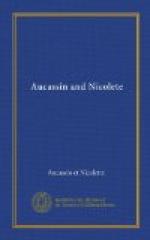Here one singeth:
Aucassin when he had heard,
Sore within his heart was stirred,
Left the shepherds on that word,
Far into the forest spurred
Rode into the wood; and fleet
Fled his horse through paths of
it,
Three words spake he of his sweet,
“Nicolete the fair, the dear,
’Tis for thee I follow here
Track of boar, nor slot of deer,
But thy sweet body and eyes so clear,
All thy mirth and merry cheer,
That my very heart have slain,
So please God to me maintain
I shall see my love again,
Sweet sister,
friend!”
Then speak they, say they, tell they the Tale:
Aucassin fared through the forest from path to path after Nicolete, and his horse bare him furiously. Think ye not that the thorns him spared, nor the briars, nay, not so, but tare his raiment, that scarce a knot might be tied with the soundest part thereof, and the blood sprang from his arms, and flanks, and legs, in forty places, or thirty, so that behind the Childe men might follow on the track of his blood in the grass. But so much he went in thoughts of Nicolete, his lady sweet, that he felt no pain nor torment, and all the day hurled through the forest in this fashion nor heard no word of her. And when he saw Vespers draw nigh, he began to weep for that he found her not. All down an old road, and grassgrown he fared, when anon, looking along the way before him, he saw such an one as I shall tell you. Tall was he, and great of growth, laidly and marvellous to look upon: his head huge, and black as charcoal, and more than the breadth of a hand between his two eyes, and great cheeks, and a big nose and broad, big nostrils and ugly, and thick lips redder than a collop, and great teeth yellow and ugly, and he was shod with hosen and shoon of bull’s hide, bound with cords of bark over the knee, and all about him a great cloak twy-fold, and he leaned on a grievous cudgel, and Aucassin came unto him, and was afraid when he beheld him.
“Fair brother, God aid thee.”
“God bless you,” quoth he.
“As God he helpeth thee, what makest thou here?”
“What is that to thee?”
“Nay, naught, naught,” saith Aucassin, “I ask but out of courtesy.”
“But for whom weepest thou,” quoth he, “and makest such heavy lament? Certes, were I as rich a man as thou, the whole world should not make me weep.”
“Ha! know ye me?” saith Aucassin.
“Yea, I know well that ye be Aucassin, the son of the Count, and if ye tell me for why ye weep, then will I tell you what I make here.”
“Certes,” quoth Aucassin, “I will tell you right gladly. Hither came I this morning to hunt in this forest; and with me a white hound, the fairest in the world; him have I lost, and for him I weep.”
“By the Heart our Lord bare in his breast,” quoth he, “are ye weeping for a stinking hound? Foul fall him that holds thee high henceforth! for there is no such rich man in the land, but if thy father asked it of him, he would give thee ten, or fifteen, or twenty, and be the gladder for it. But I have cause to weep and make dole.”




